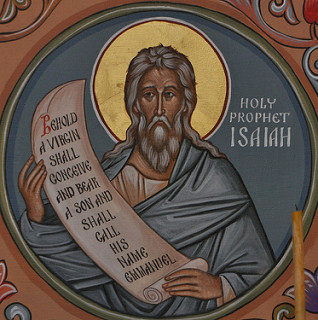You can listen to a podcast of this post at https://www.spreaker.com/episode/i-lent-thursday-esaias-2-11-21–59116193
Thus saith the Lord: For the eyes of the Lord are high, but man is low; and the haughtiness of men shall be brought low, and the Lord alone shall be exalted in that day. 12 For the day of the Lord of hosts shall be upon every one that is proud and haughty, and upon every one that is high and towering, and they shall be brought down; 13 and upon every cedar of Libanus, of them that are high and towering, and upon every oak of Basan, 14 and upon every high mountain, and upon every high hill, 15 and upon every high tower, and upon every high wall, 16 and upon every ship of the sea, and upon every display of fine ships. 17 And every man shall be brought low, and the pride of men shall fall: and the Lord alone shall be exalted in that day. 18 And they shall hide all idols made with hands, 19 having carried them into the caves, and into the clefts of the rocks, and into the caverns of the earth, for fear of the Lord, and by reason of the glory of his might, when he shall arise to strike terribly the earth. 20 For in that day a man shall cast forth his silver and gold abominations, which they made in order to worship vanities and bats; 21 to enter into the caverns of the solid rock, and into the clefts of the rocks, for fear of the Lord, and by reason of the glory of his might, when he shall arise to strike terribly the earth.
Here Esaias prophesies that the Lord will destroy all idolatry in “the day of the Lord” “when He shall arise to strike terribly the earth.” In other words, God Himself is going to put an end to idolatry through afflicting sinful society so greatly that the arrogance of men will be destroyed when they suffer an overwhelming terror and devastation resulting from God’s punishment. This prophecy has historical, Christological, and eschatological fulfillments.
There are historical fulfillments, because we see in history that God has indeed frequently destroyed man’s arrogance through dreadful disasters, the Flood of Noah and the incineration of Sodom and Gomorrah being the archetypal examples; in the time of the Old Testament prophets like Esaias, they experienced “the day of the Lord” every time God struck them down with social catastrophes like military defeats and famine. The “day of the Lord” also contains a Christological meaning, because at the First Coming of Christ and His rejection by the Jews, the Lord sent the Romans to destroy their nation and punish terribly their idolatrous worship of themselves. And “the day of the Lord” will, finally, be the Second Coming of Christ, when He shall destroy the power of Satan once and for all, and cast him and his followers into the lake of fire.
The historical and Christological “days of the Lord” had a therapeutic as well as a retributive purpose: God did these things not only to punish man, but also to inspire him to repent. At the last “day of the Lord,” however, God’s judgment will be final, for “there is no repentance in hell.”
In our daily lives, we experience “the day of the Lord” when afflictions willed or allowed by God humble us. The pain we suffer startles us; it wakes up, and the grace of repentance given at that moment enables us to see what we had not seen before, that we had made an idol out of some created thing like money or bodily health or the esteem of other men. It is not that these things are evils in themselves. They are in fact things essentially good, for we need material resources and health to perform our duties to family and to society, and the health of human society requires that a due measure of honor and esteem be rendered to those to whom honor and esteem are due, both according to the station and to the merits of the men involved. But these are only secondary goods, instruments of virtue not virtue in themselves. It is so easy to mistake the secondary for the primary, and therefore we sometimes need a startling – and, yes, painful – reminder not to make this mistake. We think that we depend on God, but so often is it not the case that we are actually depending on the good things He gives us? Sometimes He takes them away, so as to remind us, “My grace is enough for thee.”
Let us, then, recognize these “days of the Lord” when they befall us, and give glory to Him who suffered so greatly for us, by accepting with patience the little sufferings He sends into our lives, for our salvation.

